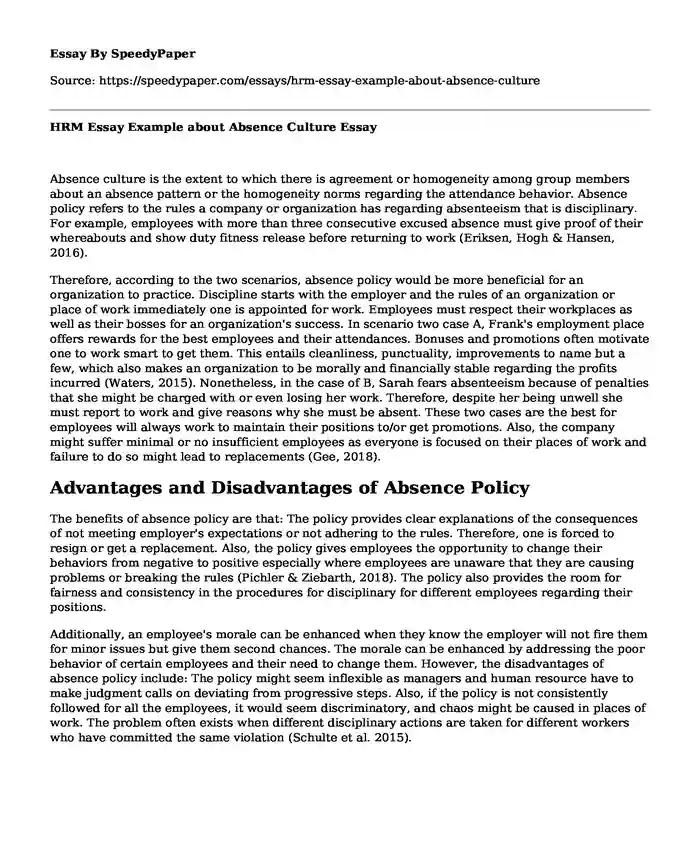
| Type of paper: | Essay |
| Categories: | Human resources Organizational behavior Organizational culture |
| Pages: | 3 |
| Wordcount: | 778 words |
Absence culture is the extent to which there is agreement or homogeneity among group members about an absence pattern or the homogeneity norms regarding the attendance behavior. Absence policy refers to the rules a company or organization has regarding absenteeism that is disciplinary. For example, employees with more than three consecutive excused absence must give proof of their whereabouts and show duty fitness release before returning to work (Eriksen, Hogh & Hansen, 2016).
Therefore, according to the two scenarios, absence policy would be more beneficial for an organization to practice. Discipline starts with the employer and the rules of an organization or place of work immediately one is appointed for work. Employees must respect their workplaces as well as their bosses for an organization's success. In scenario two case A, Frank's employment place offers rewards for the best employees and their attendances. Bonuses and promotions often motivate one to work smart to get them. This entails cleanliness, punctuality, improvements to name but a few, which also makes an organization to be morally and financially stable regarding the profits incurred (Waters, 2015). Nonetheless, in the case of B, Sarah fears absenteeism because of penalties that she might be charged with or even losing her work. Therefore, despite her being unwell she must report to work and give reasons why she must be absent. These two cases are the best for employees will always work to maintain their positions to/or get promotions. Also, the company might suffer minimal or no insufficient employees as everyone is focused on their places of work and failure to do so might lead to replacements (Gee, 2018).
Advantages and Disadvantages of Absence Policy
The benefits of absence policy are that: The policy provides clear explanations of the consequences of not meeting employer's expectations or not adhering to the rules. Therefore, one is forced to resign or get a replacement. Also, the policy gives employees the opportunity to change their behaviors from negative to positive especially where employees are unaware that they are causing problems or breaking the rules (Pichler & Ziebarth, 2018). The policy also provides the room for fairness and consistency in the procedures for disciplinary for different employees regarding their positions.
Additionally, an employee's morale can be enhanced when they know the employer will not fire them for minor issues but give them second chances. The morale can be enhanced by addressing the poor behavior of certain employees and their need to change them. However, the disadvantages of absence policy include: The policy might seem inflexible as managers and human resource have to make judgment calls on deviating from progressive steps. Also, if the policy is not consistently followed for all the employees, it would seem discriminatory, and chaos might be caused in places of work. The problem often exists when different disciplinary actions are taken for different workers who have committed the same violation (Schulte et al. 2015).
Advantages and Disadvantages of Absence Culture
Nevertheless, the benefits of absence policy include: Absent employees can be covered without the knowledge of the employer, and things run smoothly. The lazy employees often conduct this absence. Employees do not have to be stressed during work or reporting for work as permissions are always guaranteed (Schulte et al. 2015). The disadvantages of absence culture are that: If a productive employee is absent with or without permission, a certain company's activities will have to be delayed until the employee returns. Also, in cases of abrupt absence and one is covered up for, finding emergency details in the employee's department might take a long time thus making the company fall gradually (Pichler & Ziebarth, 2018). Employees are often absent with lame excuses and not considering the needs of other people or the organizations. Rewards are also rarely given as there is no consistent, trusted employee and thus, workers are not motivated to work but only work to earn salaries. Therefore, with the drawn advantages and disadvantages of absence policy and culture, absence policy is the best for an organization to practice as its pros outweigh the cons.
References
Eriksen, T. L. M., Hogh, A., & Hansen, A. M. (2016). Long-term consequences of workplace bullying on sickness absence. Labour Economics, 43, 129-150.
Gee, J. (2018). The new work order. Routledge.
Pichler, S., & Ziebarth, N. R. (2018). The pros and cons of sick pay schemes: Contagious presenteeism and noncontagious absenteeism behaviour.
Schulte, P. A., Guerin, R. J., Schill, A. L., Bhattacharya, A., Cunningham, T. R., Pandalai, S. P., ... & Stephenson, C. M. (2015). Considerations for incorporating "well-being" in public policy for workers and workplaces. American journal of public health, 105(8), e31-e44.
Waters, K. A. (2015). Teleworking in higher education: What managers should know before developing teleworking policies. College and University, 90(3), 28.
Cite this page
HRM Essay Example about Absence Culture. (2022, Jun 29). Retrieved from https://speedypaper.net/essays/hrm-essay-example-about-absence-culture
Request Removal
If you are the original author of this essay and no longer wish to have it published on the SpeedyPaper website, please click below to request its removal:
- Essay Sample Describing the Decontamination in Rural Hospital
- Free Essay Sample on the Innovations of Electricity
- Free Essay: Intertextuality Between Dagoberto Gilb's Shout and Jhumpa Lahiri's A Temporary Matter
- Free Paper Sample: E-Commerce in Grocery Stores
- Paper Example - Permanent Injuries in the NFL: Thoughts on the Video
- Essay Sample on How Macbeth Reacts to Success
- Employee Engagement and Retention. Paper Example
Popular categories




